Oakden Senate inquiry: Families desperate for answers
On Tuesday, families of Oakden nursing home residents will recount the worst moments of their life. Adam Langenberg reports on their quest for answers.
SA News
Don't miss out on the headlines from SA News. Followed categories will be added to My News.
- First Oakden staffer charged by police
- Exposed: Oakden abuse
- ICAC inquiry to examine what ministers knew
RINA Serpo doesn’t like talking about her three years of hell. About how she watched her husband, Ermanno, being dragged by the collar across a room at the Oakden nursing home and thrown into a chair.
Or how he was continually overmedicated and had five falls in his last days at the mental health facility – just weeks before his death.
How she blames herself for her husband ending up in the condemned facility widely associated with horrific restraint practices, overmedication and abuse. But on Tuesday, her daughter, Alma Krecu, will recount the worst moments of her life for her at a Senate inquiry into aged-care practices around Australia.
Because Mrs Serpo isn’t afraid any more. And because she wants to prevent just one person from going through the heartbreak she and Alma still feel every day.
Senators will also hear how the abuse Stewart Johnston’s mother, Helen, suffered at the facility ruined his family’s life. How he keeps thinking about the carer who threw her on to a toilet, slapped her face and threw her back into the bed.
And how angry it makes him that the abuse continued at Oakden for another nine years after he called the police.
Barb Spriggs will tell our politicians how she can’t bring herself to read Chief Psychiatrist Aaron Groves’ report into the abuse at Oakden.
But when she did flick to a page, her heart broke because she recognised the abuse detailed in it. Only she didn’t know it was abuse at the time.
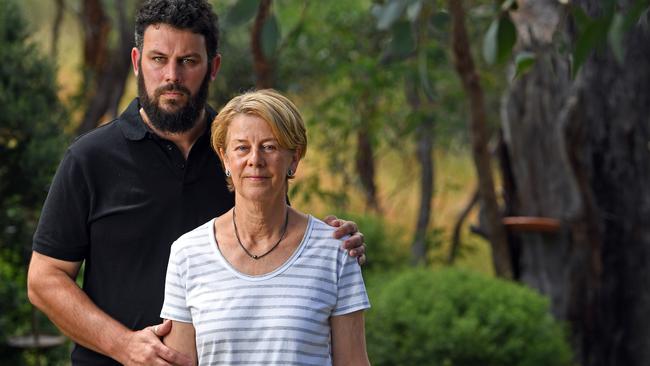
How she was so worried about what was happening to her husband, Bob, that she pushed and pushed for an investigation to be held into the facility – the review that brought about its closure.
But to these brave families, the Senate inquiry isn’t a counselling session to relieve their pain or to receive glib assurances.
The Senate inquiry may be the only chance for South Australians to know who perpetrated the abuse, who knew what and when – both inside Oakden and in Government ranks – before the March election.
That’s because a separate investigation by Independent Commissioner Against Corruption Bruce Lander will not be completed until after the election because he is snowed under by 37,000 documents.
The Senate inquiry could be the only vehicle to understand the sheer scale of abuse perpetrated.
Even Ermanno Serpo’s family – who said they weren’t surprised by Dr Groves’ report because of how much abuse they witnessed – acknowledge their pain might just be a “drop in the ocean”.
Mr Johnston said the inquiry was a crucial step achieving the goal that drives him – unmasking those who perpetrated abuse at the facility.
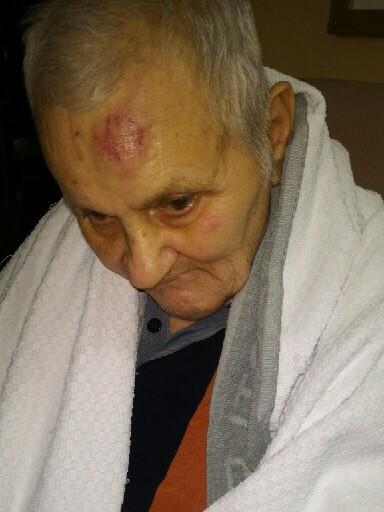
“I think, collectively, the Senate inqury and the ICAC are going to collectively allow a torch to be shone finally on what occured at Oakden,” he said.
“There is the opportunity for everyday people to come forward and submit their knowledge of what happened.”
Previously inquiries have always been the police investigating the police, the watchdog investigating the watchdog. I’ve read some of the submissions and the confidential submissions already and it absolutely is from everyday carers, workers, the good people in the industry.”
The inquiry has received 71 submissions, with 27 marked confidential or from people who had requested their names be withheld — sparking hope new information would be uncovered.
Conversely Ms Krecu said she didn’t have much faith in the Senate inquiry bringing about change.
“Yes, they’ve closed Oakden, we’ve got a new facility, but all the promises along the way like (former mental health minister) Leesa Vlahos, where is she now? (former health minister) Jack Snelling, where is he now? Who’s being held accountable?” Ms Krecu said.
“With the ICAC inquiry maybe someone will be held accountable but I think the (State) Government is just putting roadblocks in the way.”
Mrs Serpo and Ms Krecu said Dr Groves’ report didn’t surprise them after three years of spending 12 hours each day at Oakden.
They saw residents pushed into walls, left to sit in soiled pants for hours. Mrs Serpo said she narrowly stopped her Ermanno, who she calls “Eddie”, from being given the medication belonging to another resident, Mario.
They saw how their complaints seemingly fell on deaf ears, never enough to prompt change to occur.
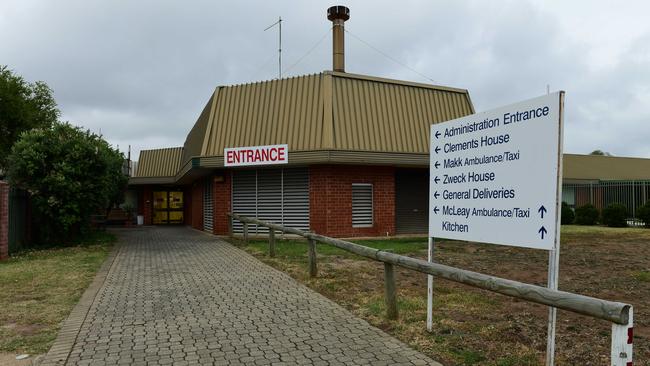
“I wouldn’t leave the place. They was all mistreated (sic),” Mrs Serpo said.
Former Senator Nick Xenophon pushed for the Senate inquiry and said it was necessary because the ICAC investigation was “shrouded in secrecy”.
“it just highlights the need for open ICAC maladministration headings,” Mr Xenophon said.
“What happened to these residents and their families should never happen again.”
No Government minister will appear at the inquiry, as flagged previously by Premier Jay Weatherill.
But the chair of the Northern Adelaide Local Health Network’s Oakden response oversight committee, Dr Tom Stubbs, will appear.
A Government spokeswoman said it was working to implement all of Dr Groves’ six recommendations and would consider the committee’s recommendations once it handed down its report.
“What happened to residents in the Makk and McLeay wards at the Oakden Older Person’s Mental Health Service was completely unacceptable,” she said.
“We have closed Makk and McLeay and have moved residents, in consultation with their families, to appropriate care settings including the newly refurbished Northgate House.”
The families’ suffering has already brought about unannounced spot visits as part of a shake-up of the federal regulatory scheme governing nursing homes, but the families want their appearance at the inquiry to inspire courage. Most of all they want it to inspire change.
Mrs Spriggs said she wanted most of all for good to come out of her suffering.
“We want to work with people, not against them. Because we want good to come out of it. We don’t want to be rubbing people up the wrong way and causing bad feelings between people,” she said.
“Our family I think would like to know why it went wrong, where it went wrong and to know that those people are accountable for it and that is publicised because I think South Australians want those answers.
But in the big picture, we just want good to come out of it.”
An accidental whistleblower, Mrs Spriggs’ relentless pursuit to find out what happened to her 66-year-old husband at Oakden prompted the facility’s closure, and saw her awarded as Senior South Australian of the Year earlier this month.
She said her success in navigating the complex quest for answers and fighting the bureaucracy would hopefully empower other people to speak up if they had similar concerns.
“It’s not been an easy journey for me, I don’t have any tertiary education. I finished school when I was 15, I had no qualifications behind me,” she said.
“You ask me to write three paragraphs on a bit of paper for you I would be using a dictionary or googling half the words. So it’s not been easy, but you can do it if you feel there’s a reason behind what you’re doing.
If I can inspire other people to do that, that would be great.”
Ms Krecu said Oakden illustrated that people should not be afraid of speaking up if they suspected something was amiss.
“You need to get out there, you need to protect your loved ones. You need to be their voice,” she said.
“Don’t rely on the Government, don’t rely on the ICAC, don’t rely on the Senate inquiry to get things right.”
‘I’ll never find peace’
Ermanno Serpo spent just under three years at Oakden. His decline from a happy and healthy man to being sent to Oakden was rapid.
He went from going on an ocean cruise in December 2012 to being diagnosed with Lewy body dementia, becoming so aggressive his family was left with no option but to send him into a nursing home just four months later.
His wife, Rina, said she witnessed her husband being dragged across a room and thrown into a couch.
The agency carer was no longer allowed to work at Oakden after the result, but a police investigation did not result in charges being laid.
The family said Ermanno, known to his wife as “Eddie”, was routinely overmedicated at the facility and suffered five unwitnessed falls in his last week at the facility.
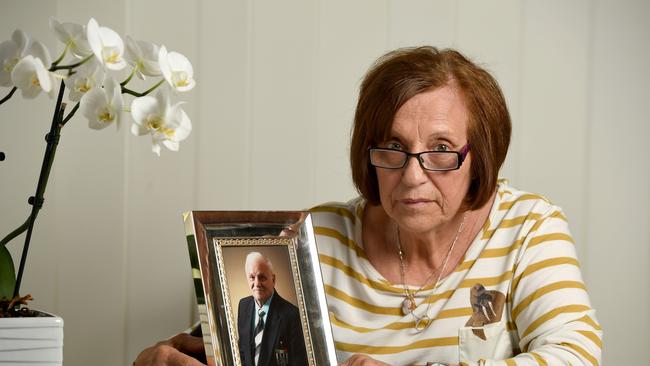
Mrs Serpo also says she saw another resident thrown into a wall.
Mr Serpo died at the Royal Adelaide Hospital in April 2016, with his wife saying she could not find peace as a result of what her husband went through at Oakden.
“I can never find peace. Because he was mistreated for last three years and overmedicated for three years – not three weeks but three years,” she said.
“I will never forgive myself for putting my husband in that place but I didn’t have a choice. I will never find peace.”
The couple’s daughter, Alma, said her mother spent as much as 18 hours a day at the facility because she was continually worried about what was happening to Mr Serpo.
“It was like One Flew Over the Cuckoo’s Nest, that’s what it was like,” she said.
“We were there all the time. We saw things but there were lots of resident who had no one and I would hate to think what they went through.”
‘They just didn’t want to listen’
Stewart Johnston’s mother, Helen, went to the Oakden nursing home for just two weeks in 2008.
Aged 71 at the time, Helen went to the facility to receive electro-convulsive therapy to treat chronic pain.
Mr Johnston said his mother tearfully told him she had been assaulted just four days into her stay at the facility.
He said his mother was thrown into a wheelchair after pressing the aid bell to go to the toilet and thrown onto the toilet, where she was left by a carer.
Helen was slapped after she pressed the aid bell to return to her room and forced to wait on the toilet before the carer returned.
Mr Johnston reported the abuse to management and the police, but says his complaint was fobbed off.
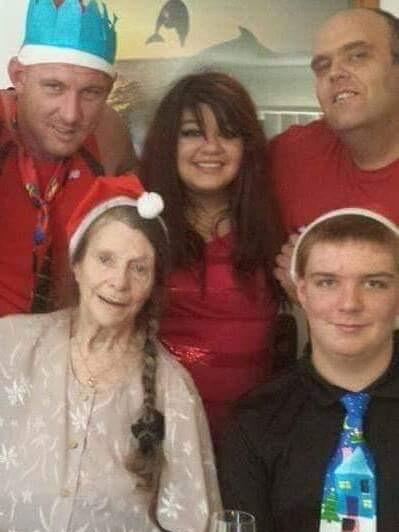
He says he was left fuming and horrified at the abuse detailed in Chief Psychiatrist Aaron Groves’ report because the abuse continued for nine more years after his complaint.
Ms Johnston died in 2014, with her son saying the whole family lived with the abuse for the rest of her life.
He’s determined to know who abused his mother – having only been told a pair of carers were stood down pending investigation, but never knowing more.
“Mum was incredibly anxious every time she went into a hospital for treatment,” he said.
“They have got to be brought before whatever justice needs to be served because they allowed, either directly or indirectly, for my mother to be physically assaulted, which changed her life and changed my life and absolutely broke my father’s heart.
“This could have finished – and not even started – if I had have been listened to nine years ago, so I’m sure as hell not walking away now.”
Crusader’s drive to save others from suffering
Barb Spriggs’ husband, Bob, 66, was routinely overmedicated during his two weeks at the facility. Mrs Spriggs quest for answers came after she saw her husband covered in bruises.
Mr Spriggs, who was diagnosed with Lewy body dementia and psychological condition Capgras syndrome, was told Oakden was his only option after he spent less than 12 hours in a private nursing home.
A disorientated Mr Spriggs hit a nurse at the facility, with the family forced to send him to Oakden.
Her son, Clive, said it was evident something was horribly wrong at the facility from the moment he stepped foot in it.
“Everyone that we’ve spoken to that has had a patient at Oakden … everyone has all said
the same thing. You only had to drive up the driveway or walk in the front door to know this wasn’t right,” he said.
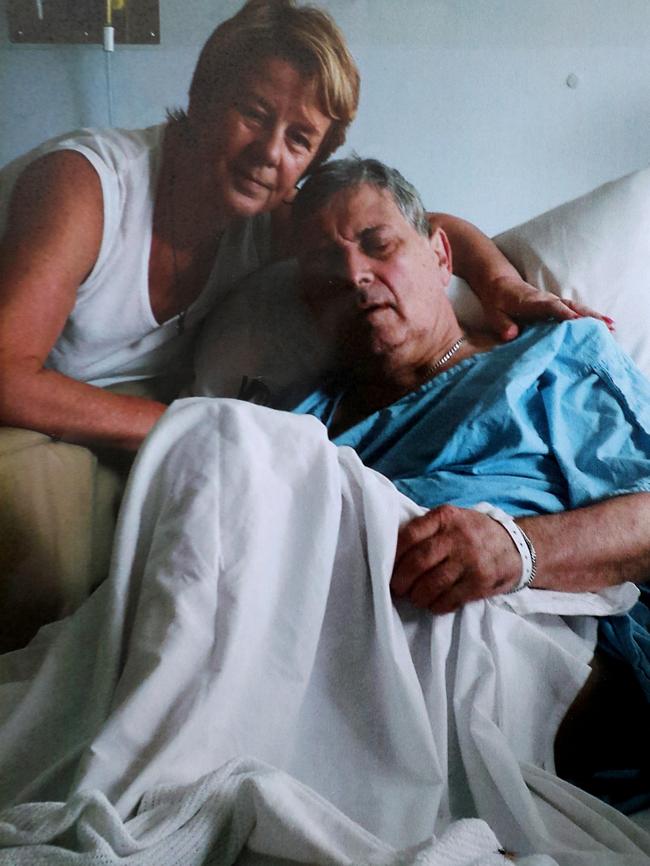
Mrs Spriggs said she was filled with unease during her husband’s stay at the facility.
“We all made sure we went out every day at different times so we could see what’s going on,” she said.
“I remember Clive saying to me ‘Mum, you can’t keep driving all that way every day and you don’t need to’ and I said to him ‘I do need to until I know that they’re looking after your Dad properly and he’s comfortable and when we get to that point then maybe we’ll go out two or three times a week’.
“But we never got to that stage so we went out there every day.”
Mrs Spriggs’ consistent pushing for answers about her husband’s treatment at the facility eventually triggered Dr Groves’ report and the facility’s subsequent closure.
Her relentless campaigning resulted in her given the honour of Senior South Australian of the Year.
Mrs Spriggs said her drive was to ensure other South Australians did not have to endure the suffering they had.
“The thing I want to get out is to let Australians, and particularly South Australians, know that it doesn’t matter who you are, where you live, and what kind of education you had, if you see something wrong, you can speak out and you can make a difference,” she said.


